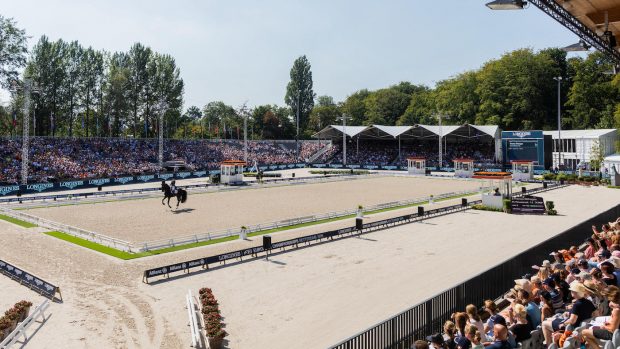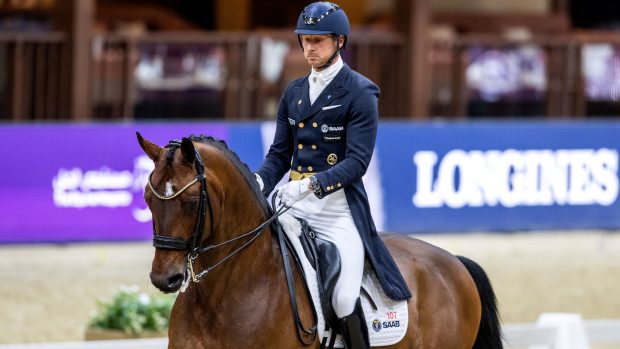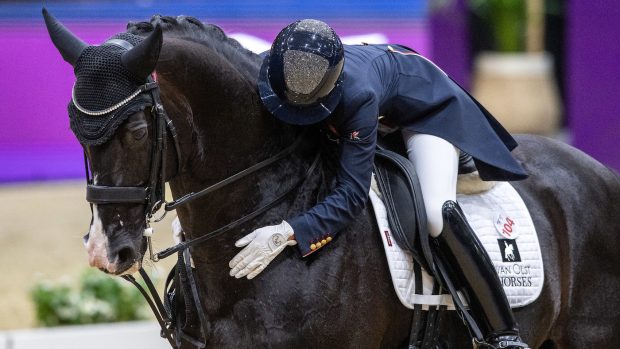The wisdom of changing FEI rule 401.1 to reflect that the dressage horse should be a “happy athlete” was the centrepiece of debate at the two-day Global Dressage Forum at the Dr Joep Bartels Academy at Hooge Mierde, Netherlands this week.
Dirk Willem Rosie of the KWPN (Dutch Warmblood) Studbook laid much of the responsibility for the athlete’s “happiness” at the door of the breeder.
“A worthwhile and rewarding life as a dressage horse requires the correct physical conformation and temperament,” he said. “It is the task of studbooks to realise these requirements and provide dressage riders with good horses — so that the horse is never over-demanded.”
Dirk Rosie also noted the results of a survey of 700 riders at small tour level who said that zealousness, sensitivity and perseverance are necessary attributes for a horse to be success in dressage.
Athens Olympic individual gold medallist Anky van Grunsven pointed out that from her experience of Bonfire and Salinero, the most sensitive horses are also the most spooky and nervous.
“My very sensitive horses react to everything in training and this way you find a way for your horse to start to trust you more. But the rider must be able to stay calm.”
Dr Eric van Breda, a specialist in comparative human and equine training and exercise physiology moved the debate on by saying that happiness cannot be measured in equine athletes as it is in human athletes.
“From a scientific point of view we need to find a way of measuring the dressage horse’s ‘happiness’. But this needs a lot more field research [rather than theoretical] and out of competition measurements of ‘happiness’ [to provide a control].”
Top dressage trainer/rider Kyra Kyrklund went on to outline her approach to training – which she pointed out was based on 30 years of training horses and developing a mutual respect, whilst understanding the horse’s basic nature as a herd and flight animal.
“The horse is not machine, and the end in training does not justify the means, but we must not attribute human traits to the horse” she said. “Horses don’t have a goal, they don’t plan for the future, therefore we have to make sure that they are happy every day.”
This was based on good sound management practices and variety in training ideas on which she outlined with the help of her pupil and 2003 European silver medallist Jan Brink.
Kyra pointed out that most of the time riders deal with half-talented horses and so the responsibility is on the riders’ shoulders to have a toolbox of skills, knowledge and different ways of explaining things to a horse so that it can understand what is required of him.
“The dressage community has to take collective responsibility for this and it’s important that FEI committees have representation from riders and trainers on them,” said Kyra.
David Hunt, president of the International Dressage Trainers Club spoke for a lot of the delegates and echoed Kyra’s concerns about the interpretation of the new rule: “The “happy athlete” is a good perception but it has its disadvantages — it can be misinterpreted very easily.
“The reality is that when FEI judges make something gospel sometimes they don’t realise the message they’ve left behind.”
He used as an example a recent judges’ training seminar in the UK where the speaker said that horses should show no resistance in the mouth. Many trainee judges were left with the impression that an open mouth should always be penalised.
“But if judges start becoming over-critical on the mouth then riders will find ways to shut the horse’s mouth up,” he continued. “I’m pleading with the international judges to look at what they leave behind and how rule changes such as this may be interpreted in the real world.”



